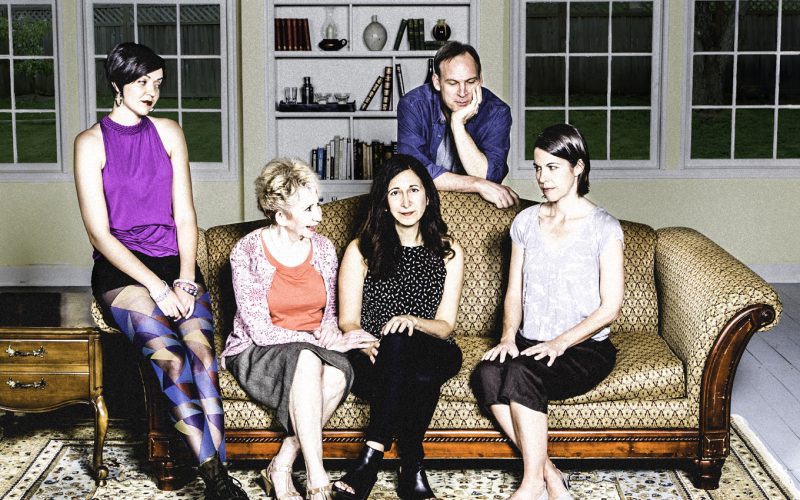 TheatreSquared’s newest play to debut, “Rapture, Blister, Burn,” by Gina Gionfriddo takes on a generational perspective of feminist values and viewpoints with the characters’ lives acting as the vehicle. The play pokes at theories about a woman’s role in society, marriage and career and challenges these issues head-on while presenting them in an educational, relatable and entertaining way.
TheatreSquared’s newest play to debut, “Rapture, Blister, Burn,” by Gina Gionfriddo takes on a generational perspective of feminist values and viewpoints with the characters’ lives acting as the vehicle. The play pokes at theories about a woman’s role in society, marriage and career and challenges these issues head-on while presenting them in an educational, relatable and entertaining way.
The play centers around Catherine “Cathy” Croll (Amy Herzberg), a popular feminist academic whose books about women working in the sex industry have landed her talk show punditry and a successful, independent lifestyle in New York City. However, after her aging mother, Alice (wonderfully played by Joan Porter) narrowly survives a heart attack, this incites Cathy to move back in with her mother in small-town New England.
Soon, Cathy reconnects with two of her friends from graduate school: her old flame Don Harper (Michael James Reed) and former roommate Gwen (Jonny Schremmer) who have since married — a stark contrast to Cathy’s life.
Throughout the course of the play, the plot presents and extrapolates upon the burning question to the characters, is the grass really greener on the other side?
Gwen and Don are miserably content and married with children, and Gwen is jealous of the self-fulfilling life Cathy leads. Yet, Cathy laments never having gotten the chance to pursue a marriage and raise a loving family with Don. In the past, their relationship de facto ended when Cathy studied abroad in England for a year, which ended up providing a window for Gwen and Don to get together. In his glory days, Don was an inspired academic, but now he’s become a lazy, porn-addicted pothead. Gwen, a definitive type-A personality, hates it but doesn’t seem willing to do anything about it either.
So now that Cathy is back in town where Don is a dean at the local liberal arts school, Cathy convinces Don to hire her for a summer session feminism course. The only two students who sign up for it? Gwen, and her punk-rock 21-year-old babysitter Avery (played excellently by Stephanie Bignault).
The first “classroom” scene in Alice’s home where the women of the play debate the varied viewpoints within feminism over martinis is where this local production finds its stride. The ensemble feels especially organic in this scene, where the audience is treated to a generational perspective from Alice, Gwen and Avery on the ideas of a woman’s role in society. The debate rolls around the anti-feminist views of Phyllis Schlafly, and those of Betty Friedan, one of the feminist movement’s heroines.
The classroom scenes also dig into several fascinating topics about feminism in relation to horror films, torture and sadistic porn. The wry dialogue that follows makes the play especially worthwhile and provides something to chew on afterwards.
Most of the audience at the Sunday afternoon show was of the gray hair variety, and during intermission I heard two older women discussing what they had seen so far. One of them said, “It’s so interesting to hear these characters talk about the things we’ve lived through” as they referred to Alice’s dialogue about her society’s views on marriage.
From my perspective, I found Avery’s ideals and opinions more relatable. So in that sense, the play and performances were spot on for capturing the generational gap’s perspectives.
Bignault’s Avery was the star of the show. Everything from the costume design to her delivery of her dialogue and movement made her out to be the most convincing character. The character provides a rash young perspective to the play, even almost as a straw-man to the play’s unorthodox situations’ unfolding — despite her own unorthodox lifestyle. It’s especially interesting to see her transformation into the voice of reason to the other characters who supposedly have their life together. Kudos to Alice and Gwen as well, who I found to be especially well cast, entertaining and compelling in their performances.
As for Herzberg’s Cathy and Reed’s Don, their dynamic was a little stiff and lackadaisical. Sure, Don is a lazy goofball, but Reed’s delivery felt a little exaggerated at times and Cathy seemed flat overall.
The set was especially well made and contained just the right amount for suggestive immersion. Despite the domestic settings of the play, the lighting in certain scenes was creative and well used. While it wasn’t as imperative to the production, I found the music choices between scenes to be perfect selections.
The problems in motion in the play may be bourgeois in nature, (e.g. “My career has been so successful, but I’m unhappy now and want another life!”) but it’s entertaining nonetheless and serves up a definitely fun evening/afternoon that may teach you a thing or two and give you something to think on later.
3 / 5 Stars



